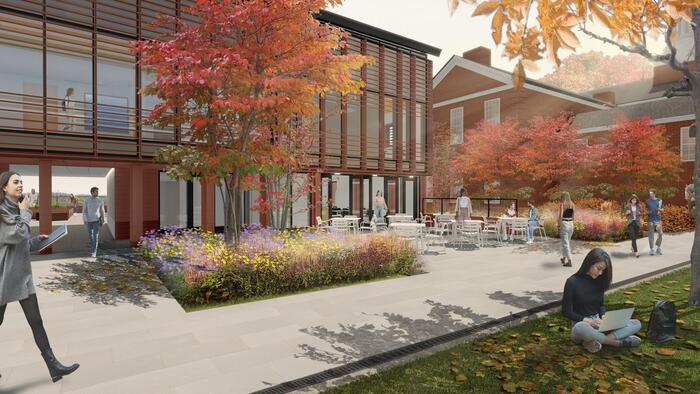Watch the Living Village Panel Discussion on LiveStream at 2:30pm (ET): https://livestream.com/yaledivinityschool
September 6, 2023
New Haven, Conn. — Yale Divinity School (YDS) will break ground on Wednesday, Oct. 11, on a building that is unprecedented in American higher education: a living-building residence hall that will house students in a way that gives back to the environment more than it takes.
Living Village groundbreaking is a featured part of Convocation 2023: Learn more here.
“The Living Village” is designed to meet the exacting standards of the Living Building Challenge (LBC), an international certification system that promotes sustainable design and construction. The project aims to make a moral and theological statement about the need for constructing buildings that are in harmony with nature in a time of climate crisis. The facility is scheduled to open in August 2025, with additional units planned in a second phase of construction.
A key component of Yale’s Planetary Solutions Project, the Living Village “will be a landmark in environmental design on a university campus and set an example for schools around the world,” Yale President Peter Salovey said. “For the next generation to have the opportunity to thrive on a healthy planet, institutions like Yale must take bold steps, of which the Living Village is one.”

The project will provide much-needed affordable housing for students and provide a valuable learning experience showing students a different way of building and living, Divinity School Dean Greg Sterling said.
“It has never been more obvious that the status quo is unsustainable,” Sterling said. “Rather than impeding a sustainable future, American religion can and must be a force for environmental responsibility and progress, as exemplified by Yale Divinity School’s Living Village project and related curricular and programmatic expansions at YDS.”
Sterling called the project an expression of the Divinity School’s “academic, theological, and moral vision,” which in addition to the Living Village includes an accelerating shift to sustainability in curricula, teaching, and operations — all designed to educate students to become “apostles of the environment.”
Among the building’s unique features are:
- Net positive carbon, energy, and water footprint
- Construction that uses recycled and environmentally benign materials
- Holistic architectural design that will connect with the school’s existing quadrangle (opened in 1932) in a united living and learning environment
The Living Village is being constructed on the Divinity School’s current parking lot. “In a reverse of the famous Joni Mitchell lyric,” Sterling said, “we are un-paving a parking lot and putting up ‘paradise.’”
When it opens in 2025, the Living Village will be the largest LBC living-certified building on a university campus. Among other “firsts,” it will also be the first LBC living certified project in the Ivy League and the first at any college or university in Connecticut.
A regenerative living-learning community: Learn more at the new Living Village website.
Bruner/Cott Architects leads the Living Village design team. Also contributing are Höweler + Yoon Architecture, Andropogon Associates, and several other firms, as well as Yale’s Office of Facilities.
Yale continues to lead in campus sustainability and is accelerating its climate action plans in response to the rapidly changing planet, said J. Mike Bellamy, Yale’s vice president for facilities, campus development, and sustainability.
“We are transforming the way the university generates and uses energy across campus to achieve its climate goals of being net zero emissions by 2035 and to produce zero actual emissions by 2050,” Bellamy said. “Using the Living Village as a case study will help inform future projects at Yale and beyond.”
Living Building Challenge founder Jason F. McLennan is a consultant to the project. “The beauty and power of a project like this,” McLennan said, “is how it will change the students who come through the Divinity School, who will go out and teach, preach, and inspire their communities. They will not unlearn their experience living in a building like this.”
News organizations are welcome to attend a series of special events that the Divinity School will host on Oct. 11 to mark the historic groundbreaking. Please contact us if you wish to attend, or if you have questions or interview requests.
The schedule includes:
- 2:30 p.m. Panel discussion of the Living Village and regenerative buildings moderated by Dean Sterling; speakers are Deborah Berke, Dean of Yale School of Architecture; Katie Dykes, Commissioner of Connecticut’s Department of Energy & Environmental Protection; Jason Jewhurst, Partner and Principal, Bruner/Cott Architects; and Julie Beth Zimmerman, Vice Provost, Yale Planetary Solutions
- 4:30 p.m. Groundbreaking ceremony
- 5:00 p.m. Program and reception
Among those planning to attend the groundbreaking are Sen. Richard Blumenthal, New Haven Mayor Justin Elicker, and Yale President Peter Salovey.
September 6, 2023